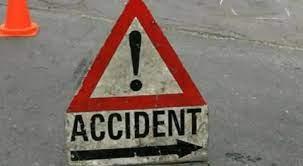News / National
ZCC blames Zimbabwe govt for road carnage
3 hrs ago | Views

The Zimbabwe Council of Churches (ZCC) has urged the government to take responsibility for the recent surge in road traffic accidents, pointing to the failure to resuscitate a reliable public transport system as a key underlying cause.
The council highlighted that recent fatal crashes, including the July tragedy at Manyame Bridge on Seke Road in Chitungwiza which claimed 17 lives, expose deep structural challenges that require urgent government intervention.
Despite government measures targeting unregistered commuter omnibuses and unroadworthy vehicles, including a ban on police officers operating public transport businesses, the road carnage persists. The ZCC said this is partly due to the government's failure to adequately support the Zimbabwe United Passenger Company (Zupco), which was once the backbone of public transport.
"The unregulated operations of commuter omnibuses, despite significant government investment in acquiring a new fleet of buses for Zupco, remain a critical contributor to ongoing road carnage," the ZCC said in a pastoral letter last week.
Zupco's inability to meet the high demand for public transport has forced commuters to rely on erratic and often unsafe private operators, the council said.
Once a symbol of national pride, Zupco has dramatically collapsed amid Zimbabwe's broader governance and economic challenges.
The government launched a publicised effort in 2019 to revive Zupco and address the country's transport crisis. However, the company's buses have since become scarce on both urban and rural routes.
"Despite procuring modern buses intended to provide safe, affordable transport, Zupco's operations have been hampered by inefficiencies such as inadequate fleet maintenance, limited route coverage, and inconsistent scheduling," the ZCC noted.
The desperation of commuters, facing limited options, compels many to use overcrowded and unsafe vehicles daily, perpetuating a cycle of danger on Zimbabwe's roads, the council said.
ZCC called for urgent revival and expansion of the public transport system to provide reliable, affordable, and safe services. It also demanded stricter enforcement of traffic laws and an end to corruption allowing unroadworthy vehicles and unlicensed drivers to operate unchecked.
The collapse of Zupco has been worsened by operational shortcomings, including allegations of fraud. The 2023 Auditor-General's report revealed that Zupco failed to account for ZW$3.4 billion in urban revenue, suggesting systemic corruption.
Additionally, buses purchased under the recapitalisation plan were reportedly bought at inflated prices, with Belarusian Dragon buses costing US$58,900 each sold to the government for US$212,962 per unit - a markup of nearly US$154,000 per bus.
Reports also claim Zupco buses are frequently diverted from public duties to ferry Zanu PF supporters to party events free of charge, further reducing availability for commuters.
The ZCC urged the government to urgently address these issues and prioritise the safety and mobility of Zimbabwean commuters to stem the ongoing road carnage.
The council highlighted that recent fatal crashes, including the July tragedy at Manyame Bridge on Seke Road in Chitungwiza which claimed 17 lives, expose deep structural challenges that require urgent government intervention.
Despite government measures targeting unregistered commuter omnibuses and unroadworthy vehicles, including a ban on police officers operating public transport businesses, the road carnage persists. The ZCC said this is partly due to the government's failure to adequately support the Zimbabwe United Passenger Company (Zupco), which was once the backbone of public transport.
"The unregulated operations of commuter omnibuses, despite significant government investment in acquiring a new fleet of buses for Zupco, remain a critical contributor to ongoing road carnage," the ZCC said in a pastoral letter last week.
Zupco's inability to meet the high demand for public transport has forced commuters to rely on erratic and often unsafe private operators, the council said.
Once a symbol of national pride, Zupco has dramatically collapsed amid Zimbabwe's broader governance and economic challenges.
The government launched a publicised effort in 2019 to revive Zupco and address the country's transport crisis. However, the company's buses have since become scarce on both urban and rural routes.
"Despite procuring modern buses intended to provide safe, affordable transport, Zupco's operations have been hampered by inefficiencies such as inadequate fleet maintenance, limited route coverage, and inconsistent scheduling," the ZCC noted.
The desperation of commuters, facing limited options, compels many to use overcrowded and unsafe vehicles daily, perpetuating a cycle of danger on Zimbabwe's roads, the council said.
ZCC called for urgent revival and expansion of the public transport system to provide reliable, affordable, and safe services. It also demanded stricter enforcement of traffic laws and an end to corruption allowing unroadworthy vehicles and unlicensed drivers to operate unchecked.
The collapse of Zupco has been worsened by operational shortcomings, including allegations of fraud. The 2023 Auditor-General's report revealed that Zupco failed to account for ZW$3.4 billion in urban revenue, suggesting systemic corruption.
Additionally, buses purchased under the recapitalisation plan were reportedly bought at inflated prices, with Belarusian Dragon buses costing US$58,900 each sold to the government for US$212,962 per unit - a markup of nearly US$154,000 per bus.
Reports also claim Zupco buses are frequently diverted from public duties to ferry Zanu PF supporters to party events free of charge, further reducing availability for commuters.
The ZCC urged the government to urgently address these issues and prioritise the safety and mobility of Zimbabwean commuters to stem the ongoing road carnage.
Source - Newsday











































